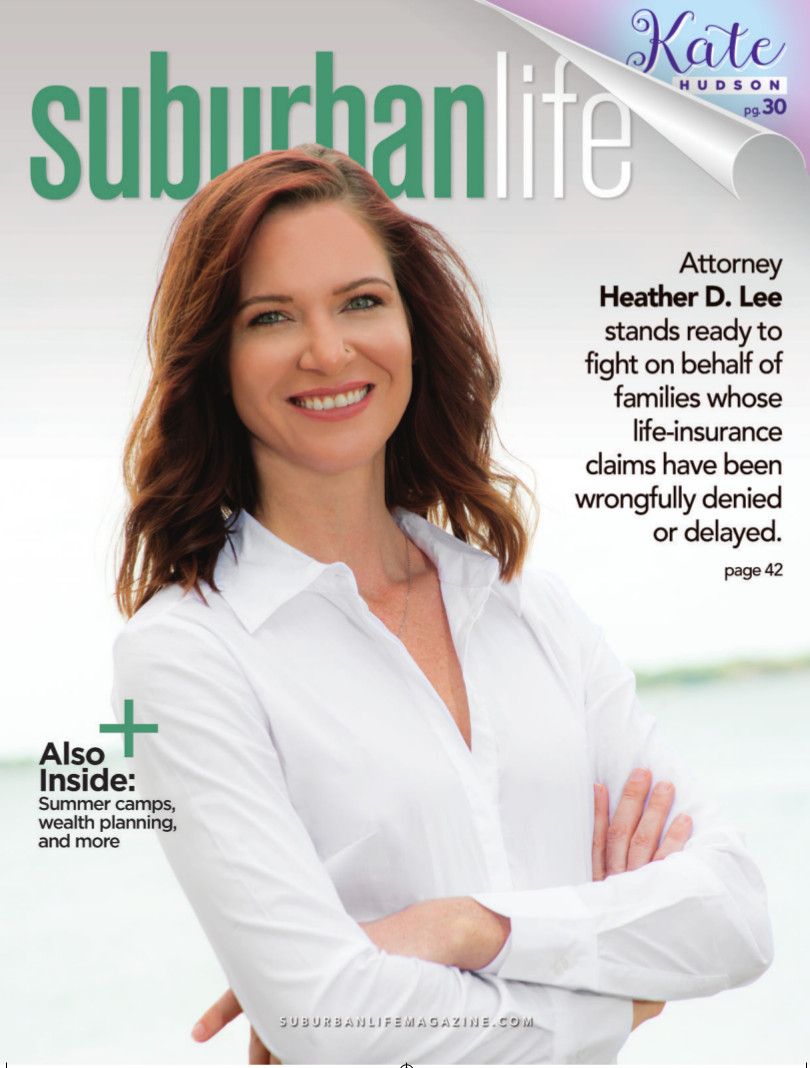
No Denying the Facts
Attorney Heather D. Lee stands ready to fight on behalf of families whose life-insurance claims have been wrongfully denied or delayed.
Heather D. Lee never planned on becoming one of the nation’s foremost champions of victims of bad faith in life-insurance claims. She discovered the need for such legal expertise almost by accident, just prior to her final year at DePaul University College of Law in Chicago.
“In law school I did very well in contract law, and I thought my focus would be in international human rights law,” says Lee, a native of North Florida. “I wound up landing a 10-week summer internship with a solo personal-injury attorney in Philadelphia who had come into some life-insurance cases. He hired me to handle them and figure them out, so I did. Before that, I didn’t even know that was an area of practice.”
Lee learned the ropes so well that the firm later brought her on full time to take the lead on life-insurance cases, which became a growing part of the firm’s business. She enjoyed the work because she excelled at it, but also because she knew her efforts had a positive impact on people in need who felt powerless against insurance companies.
She later founded her own practice, The Law Offices of Heather D. Lee PLLC, which started in Philadelphia and has since expanded to New York, Florida, and Colorado. The demand is so great that she is considering branching out to additional states, such as California. Citing data directly from the insurance companies, Lee says at least 5,000 life-insurance claims are denied every year. Many people don’t bother to fight back, she says, because they either take the insurers at their word or see the fight as unwinnable.
“Insurance companies’ M.O. is ‘delay, deny, defend,’” says Lee, who in the past 10 years has collected millions of dollars in life and property insurance proceeds on behalf of her clients. “For them, it’s a numbers game; if they deny 100 claims and only 50 people hire attorneys, they have automatically won those other 50 cases.”
Lee acknowledges that an insurance company has a right to deny a claim for legitimate reasons. But when a company shows bad faith by delaying or denying a claim for frivolous, reckless, or otherwise illegitimate reasons, she’s ready to step in on a client’s behalf. She outlines a few examples of the many ways in which an insurance company may exhibit bad faith.
* Alleged medical misrepresentation. “Insurance companies can contest a policy for two years from the date of issue, and some insurance companies will look for any reason in a medical history to deny a claim if the person dies within that period,” she says. “I had a case one time where someone had a claim denied because there was a false hepatitis C diagnosis in the medical record, and it was clearly recorded as false. It can be something small in the medical notes or a minor health issue—any medical issue, really—they can claim was misrepresented when the policy was issued.”
* Contributing factors to accidental death. “Insurance companies will look to deny or delay a claim because they say someone’s health was a contributing factor to someone’s accidental death,” she says. Example: If someone who has a history of seizures dies in a car accident, the insurance company might claim that a seizure contributed to the policyholder’s death and, therefore, deny the claim.
* ERISA ineligibility. The Employee Retirement and Security Act of 1974 applies to life-insurance policies obtained through an insured party’s employment. “If someone’s employment is terminated, they have the option to convert the policy to an individual policy,” Lee says. “What sometimes happens is that the insurance company will continue to take the premiums, but then, after the individual’s death, they try to claim after the fact that the individual was no longer eligible.”
* Lapse for nonpayment. “Say someone’s grandmother paid premiums on a life-insurance policy for 20 years, but no one else in the family knows about it,” she says. “If she becomes incapacitated, her family might find out that the policy lapsed two months before her death. You also see policies canceled because of banking issues. Maybe they pay the premiums through an automatic withdrawal but something happens and, through no fault of their own, those payments stop. No one finds out until after the fact.”
Lee has a keen understanding of the pain and difficulties a family endures when an insurance company wrongfully denies or delays a loved one’s claim. This may explain why she chose to offer free consultations to prospective clients and also forgo a retainer fee.
“I have had many people cry to me because of what they’re going through,” she says. “They don’t have the time or energy to grieve the loss [of a loved one], and some people can barely afford to pay the funeral expenses. If I accept a case, I don’t recover anything unless I’m successful. Basically, I work for free until I win, and then I take my fee when the insurance company pays the claim, so people don’t ever have to pay me a penny.”
It’s easy to understand why many people are unaware of their rights in matters involving challenges to life-insurance claims. Lee offers the following advice: “If a denial letter is received, immediately have it reviewed by a life insurance attorney, even if an insurance company seems to have a leg to stand on. Many people just accept the denial as valid, even though it may not be. Also, in contestable review cases, it can take time for the insurance companies to request and review health records, but people should contact an attorney if the review period extends beyond 90 days.”
For anyone considering investing in a life-insurance policy, Lee says to choose wisely, because the vast majority of insurance providers “are not on your side.” Her point: Consumers should thoroughly research insurance providers prior to purchasing a policy. A number of consumer-friendly online resources offer policyholders’ personal experiences with their respective providers. An excessive volume of delay-and-deny complaints may be a telling indicator of a company’s character, according to Lee.
Also, she encourages anyone who invests in life insurance to read their policy closely. Doing so may help to avoid unwanted surprises down the line.
“When people come to me, I know they are in a desperate situation,” she says. “They’re relying on me to fight for them and recover something that shouldn’t have been denied in the first place, and I am always happy to do so.”
For more information on The Law Offices of Heather D. Lee PLLC, call (800) 403-5710 or visit www.life-insurancelawyer.com.
Photograph by Mark Losh
Published (and copyrighted) in Suburban Life magazine, March 2021.



